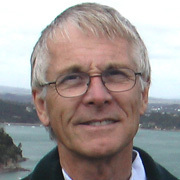
Malcolm Hall
Malcolm Hall grew up in the English city of Stoke-on-Trent, before studying Psychology and Modern Languages at nearby Sheffield University. Plans to become a linguistics professor were soon abandoned, after he was offered a job writing for a medical publication in London. So began a busy journalism and broadcasting career that has now spanned more than 40 years.
Hall did time as a print journalist in England, Canada, and Zambia before arriving in New Zealand in the early 70s, initially to work at The Auckland Star. In 1975 he was recruited by the NZ Broadcasting Corporation to train as a director. A second channel was due to launch that year; initially Hall worked in Christchurch as part of the fledgling channel’s News and Current Affairs operation. Later he directed studio-based children’s shows in Christchurch, including Romper Room and A Land Called Happy.
Hall’s ability to speak Spanish made him the obvious choice to head to Chile with reporter Bryan Allpress. The result was the Hall-directed Chile Coup, two one-hour documentaries about expat Kiwis caught up in General Pinochet’s brutal 1973 coup.
Hall then moved to Auckland to help launch TV2’s weekly current affairs programme Perspective, where he directed half-hour documentaries on everything from forensic hypnosis and youth employment, to women in prison.
As the 80s began, Hall was taking on one of his biggest assignments to date — directing three of the 10 episodes of Landmarks, the Feltex-award winning series which traced the history of New Zealand through its landscape.
Hall went on to produce and/or direct further docos, including Dead on Target - The Story of Operation Jericho, the story of an RNZAF raid on the Amiens prison; and Into the Skies, a history of civil aviation in New Zealand.
Promoted to Executive Producer of Documentaries for TVNZ in Auckland, he produced and directed several episodes of award-winning series Freyberg VC, profiling the man who commanded the NZ Expeditionary Force during WWII. In this period Hall’s wide range of projects included primetime studio specials (Survival Test) and commanding the location shoots for Pride & Joy, a series exploring life in rural centres.
In 1987 Hall joined production company Isambard, while it was still an in-house arm of soon to be launched channel TV3. When the new channel finally went on air, Hall was picked to direct the two-hour curtain-raiser which screened in November 1989. For TV3 he also produced dozens of short episodes of Pūrākau - Māori Myths and Legends, with a stellar cast of presenters (including Temuera Morrison and Rawiri Paratene), Standing in the Sunshine, which celebrated the centenary of women’s suffrage in New Zealand, and a season of McPhail and Gadsby comedy Letter to Blanchy, which was nominated for an NZ Television award.
When Billy T James did a sellout 1990 comeback concert at the Aotea Centre, following a heart transplant, Hall got the job of directing — and helping pull together an underfunded broadcast which was rushed into production on favours and deferred wages. He also worked with publisher Wendy Pye on long-running educational series The Magic Box.
In 2000 he was recruited by Dunedin production powerhouse Natural History NZ (now NHNZ). Soon he was making documentaries that screened on National Geographic and The Discovery Channel. Among them were medical series Kill or Cure and the 12-part Animal Face Off. He visited China while directing documentaries Great Wall (which saw some close calls when a van almost skidded off a cliff in central China) and Shanghai Makeover.
In 2006 one-off documentary Shark Rebellion won the prize for best wildlife documentary at Brazil's Amazonas documentary festival. Hall co-directed this chronicle of a rise in shark attacks on a coastal area of Brazil, alongside local Rodrigo Astiz.
Hall also directed and produced the New York Festival award-winning Curse of the Elephant Man, which applied DNA testing to the tragic story of Joseph Merrick, and the widely seen Colossal Squid, chronicling a squid that was preserved and studied at museum Te Papa.
After the Boxing Day 2004 tsunami, America’s Learning Channel rushed a one-hour special into production, scheduling Tsunami – The Race For Survival to screen just 17 days later. As supervising producer, Hall co-ordinated production teams in Australasia, South Africa, Thailand, Europe and the United States.
In 2015 Hall and another ex NHNZ colleague, accident and emergency doctor Paul Trotman, co-directed one-off documentary Emergency Medicine, which followed staff and patients at Oamaru Hospital over the course of year.
Sources include
Malcolm Hall
Ruth Brown, 'Stay tuned for emergency medicine doco beaming in from Oamaru' (Broken link), NZ Doctor website. Loaded 11 August 2015. Accessed 7 April 2016
Marcelo Cajueiro, 'Amazonas kudo flows to 'Journey'' - Variety, 17 November 2006
Tom Parkinson, 'Billy T Live - The Producer's Perspective' NZ On Screen website. Loaded 12 December 2008. Accessed 7 April 2016